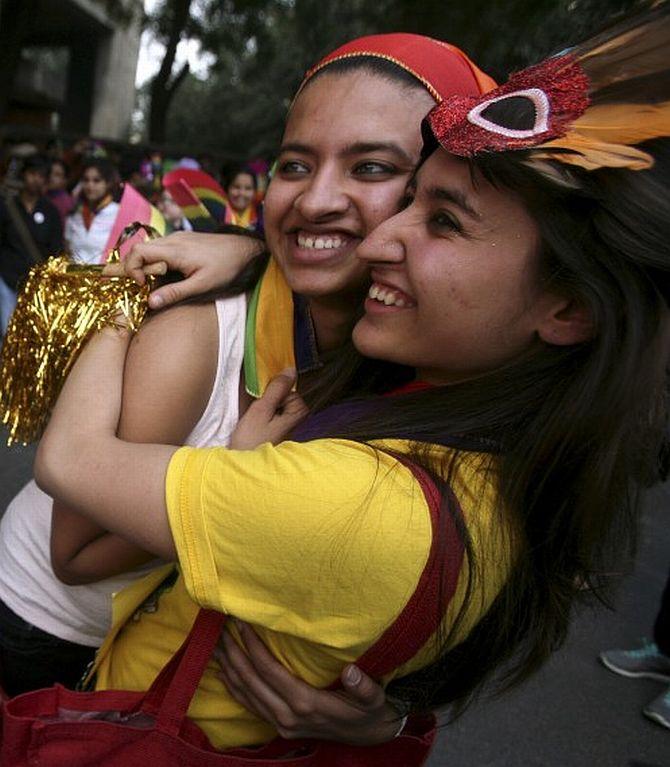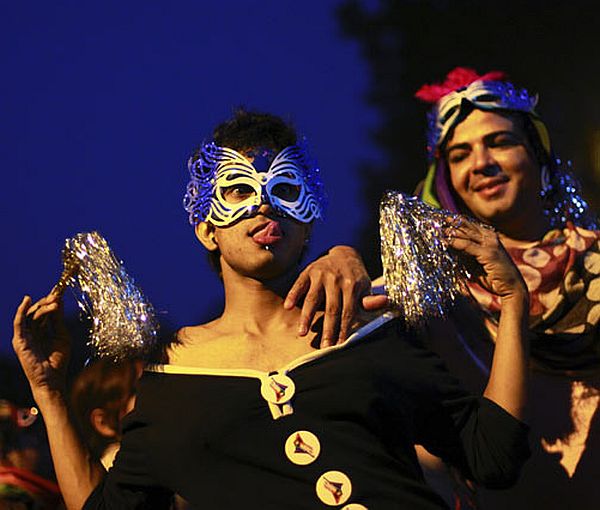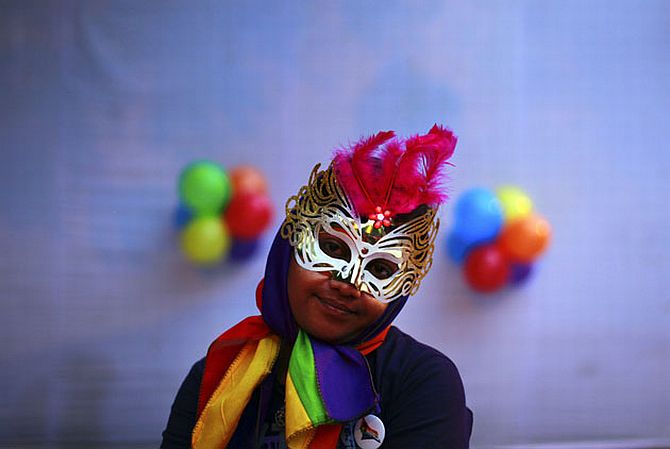 | « Back to article | Print this article |
'This verdict has taken away our right to life'
Non-government organisation Naz foundation, which was the first to file the petition for decriminalising section 377 of the Indian Penal Code, on Wednesday expressed dissatisfaction over the Supreme Court judgement upholding the constitutional validity of the penal provision making gay sex a punishable offence.
"We are disappointed with the judgement. We think the judgement is not correct in law. We will take appropriate legal recourse," senior advocate Anand Grover, who argued the case for the NGO Naz Foundation, said after the verdict was pronounced.
A bench of justices G S Singhvi and S J Mukhopadhaya set aside the 2009 Delhi High Court judgement which had decriminalised gay sex.
While setting aside the high court order, the apex court allowed the appeals filed by various social and religious organisations for making gay sex a criminal offence.
The apex court observed that there is no constitutional infirmity in section 377 of IPC which makes gay sex an offence and added that it is for the legislature to look into the desirability of deleting the provision from the law.
Activists of the NGO who were present inside the court room were visibly upset, while those outside said, "is judgement se hamara jeene ka adhikaar chhin gaya hai (this verdict has taken away our right to life)".
Click on NEXT to read further...
'Is it a crime that a child is born a lesbian or gay?
Activists also demanded that the 1861 legislation, by which section 377 is a criminal offence, be changed.
"Kya yeh crime hai ki ek bachcha lesbian ya gay paida hota hai (is it a crime that a child is born a lesbian or gay)? Yeh toh natural feeling hota hai (this is a natural feeling). Yeh kisi ka hak nahi hai ki LGBT ya gays pe dosh lagaya jai (no one has the right to blame LGBTs or gays)," the activists commented.
The verdict came on the petitions of several anti-gay right activists, social and religious organisations against the 2009 verdict of the high court, which decriminalised gay sex.
Reacting to the verdict, gay rights activist Pallav Patankar, said, "We are back into the dungeon all over again".
"Considering that this judgement is coming just a day after Human Rights Day, I think its a bad reflection on the state of things to come in this country. I am really not happy about it...
"We will fight on and we will labour on because the fight is not over yet. I think the international community as well as others are there to see what is happening in the country and I think we need to think where we exactly are going," he said.
"I think the ball was already put in the Union of India's court. They refused to discuss about it and that’s why they (NGO, Naz Foundation) went to the judicial route. I just think they are procrastinating the decision... If it is going to Union of India then again it is a procrastinating discussion," he said
Click on NEXT to go further...
'We will labour on because the fight is not over yet'
Commenting on the Apex court's judgement, a gay person from Mumbai who came to the national capital in view of the verdict, said, "The court has challenged my fundamental rights. I have right to be who I am."
Another gay rights activist, Shovini Ghosh, expressed her "shock" over the apex court verdict, saying it is "completely unsatisfactory".
"The Delhi High Court had given unprecedented protection to all the minorities. We are going to plan our strategy. This is a movement which should go on, we are not going to give up. I will first challenge the idea that the religious group can dictate something in a secular country.
"I will not go by what they say. All kinds of criminal acts, like demolition of Babri Masjid was done by religious groups... I think government has actually changed its position from what it had said during the hearing that it stands enlightened in light of the high court verdict," she said.
Ghosh also said, "We are going to go out and tell the people. We will be carrying out this movement. We have huge support from the people, we are going to fight it."
Nitin Karani, a gay rights activist and former editor of Bombay Dost magazine, said, "It is a very good opportunity for the government to show as the Parliament session is on and they should bring an amendment in the IPC to show that they really meant what they had said in the Supreme Court."
Amod Kanth, General Secretary of Prayas, who was one of the petitioners against the Delhi high court verdict, welcomed the Supreme Court judgement upholding the legality of Section 377 of the IPC and said it was the only protection for sexual offences against a male or a male child. It was also a protection against unnatural sex and bestiality.
"In India, there is protection for sexual offences against a male or male child except for this Section. Around 97 per cent of such offences are made against the male child in the country," said Kanth, a former Chairman of the Delhi Commission for Protection of Child Rights (DCPCR).
Click on NEXT to go further...
'Parliament must immediately pass legislation to restore the rights and freedom that have been denied today'
Kanth said, decriminalisation of Section 377 would have denied the child's basic rights to family and impeded his normal development, as two male or two female don't constitute a family
"Only a man and a woman constitutes a family and contribute for the holistic development of a child, which is not possible without a father and a mother," Kanth said, adding that the United Nations Convention for Rights of Children, to which India was also a signatory, says Right to Family was a child's basic right.
He also said researches across the world, including one of World Health Organisation (WHO) have suggested homosexuality as a deviant and abnormal behaviour and incidents of drug abuse, sexual diseases and problem of criminality was more prevalent in this community.
"Even the Naz Foundation has contented that HIV/AIDS and STD (sexually transmitted disease) were more prevalent among homosexuals, in there petition to legalise Section 377. Taking this into account, it should not have been made legal," Kanth said, who is General Secretary of Prayas Juvenile Aid Centre (JAC) Society -- a voluntary Organisation for neglected and delinquent children operating in eight states/UTs.
Meanwhile, rights body, Amnesty International India termed the verdict a body blow to people's rights to equality, privacy and dignity.
"This decision is a body blow to people's rights to equality, privacy and dignity," said G Ananthapadmanabhan, Chief Executive, Amnesty International India.
He said Government of India had said that it was in favour of decriminalising homosexuality.
"Now is the time to act on its word. Parliament must immediately pass legislation to restore the rights and freedom that have been denied today," Ananthapadmanabhan said.



